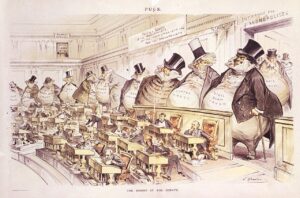Trump Has Stuffed His Cabinet With Oligarchs Poised To Govern For Their Profit
No Comments yet
The Bosses of the Senate, a cartoon by Joseph Keppler. First published in Puck 1889.
01-05-2025 ~ The circle of billionaires in Trump’s cabinet embodies the reign of American oligarchy.
In the narrative of mainstream U.S. media, oligarchs — super-rich, politically connected individuals with influence over the state — exist only in post-communist countries and post-colonial societies in Latin America, Asia and Africa. Their power is seen as a foreign, un-American deviation from capitalism. In reality, however, the United States’ own oligarchs are thriving.
The U.S., despite the continued reverie expressed for democratic ideals, has shown to be a full-fledged plutocratic oligarchy — and for the next four years, it will be run directly by the oligarchs themselves. President-elect Donald Trump has assembled an administration of billionaires and warmongers whose combined wealth runs into hundreds of billions of dollars.
In a way, there is nothing surprising about this disturbing development. The rich in the U.S. have seen their wealth rise dramatically over the past 30 years, and the last four years have been particularly great for billionaires. Most people in the U.S. think that the economy works only for the rich and the powerful.
Of course, money in the U.S. has always been “the measure of everything,” and the country’s politics and economy have always been dominated by a wealthy few. The founders of this country were not only white but also rich men who had a very restricted notion of freedom and equality; most of them were also enslavers. Thomas Jefferson, a principal author of the Declaration of Independence and third president of the United States, enslaved more than 600 people. White property owners were the only group of people allowed to vote in the first presidential election.
By the 19th century, robber barons and captains of industry of the Gilded Age held enormous political influence, which came about as a result of the vast wealth they had accumulated by using unethical tactics to dominate industries and ruthless methods to exploit workers. The likes of Cornelius Vanderbilt, Andrew Carnegie, John D. Rockefeller and J.P. Morgan ruled the country — Morgan even bailed out the U.S. government twice during his lifetime.
How did Morgan get so rich and powerful in the first place? He did so mainly through the founding of private banks and industrial consolidation, i.e. by combining small companies into one big corporation and thus creating monopolies. Morgan hated competition and believed that U.S. capitalism should be under the control of financial wizards like himself. He made a huge fortune on railroads and in steel. He rescued the U.S. Treasury in 1895 following the Panic of 1893 by selling a portion of his companies’ own gold reserves to the government in exchange for a 30-year bond. In doing so, he made of course a lot of extra money in the process. And averted the collapse of the financial system during the Panic of 1907, which disrupted the entire economy, by arranging the bailout of several large New York banks as the Federal Reserve did not exist and thus there was no lender of last resort.
Morgan saved the country twice, and many Americans saw him as a true patriot. But, as historian Richard A. Naclerio has written, “to those who rigidly examined his actions, he was a monster who fed off the demise of economic destruction.”
The presence of a plutocratic oligarchy in U.S. society is not an aberration. It has always existed and will exist as long as capitalism does. It cannot be solved within the existing state of socioeconomic affairs. What is unique with Trump’s team of billionaires is that, if all are confirmed, will make his administration the wealthiest in U.S. history.
And then there is Elon Musk. A proto-fascist tech oligarch, the world’s richest person spent “at least $260 million” helping Trump get reelected and find his way into Trump’s inner circle. He now has been tasked with leading — along with Vivek Ramaswamy, another major donor — a newly created “Department of Government Efficiency” (DOGE), an entity that Trump indicated will operate outside the government. In other words, DOGE is not an official federal agency or commission that requires congressional authorization, and its role will be to advise the White House on slashing spending and dismantling the federal bureaucracy.
The creation of DOGE is part of the conservative vision for smaller government outlined by Project 2025. It is expected to focus on rolling back government regulations, cutting entitlement programs like Social Security and Medicare, targeting the Internal Revenue Service and the Department of Education, potentially stripping federal workers of protection by replacing civil servants with political appointees and even eliminating certain parts of the government, with the stated aim to slash at least $2 trillion from the nearly $7 trillion federal annual budget. Musk is particularly hostile to regulation and happens to be involved in several ongoing legal battles with regulatory bodies. One of his companies, SpaceX, has even filed lawsuits seeking to dismantle the National Labor Relations Board.
Although it is totally unrealistic to find $2 trillion in federal budget cuts, the plan to drastically cut the federal government can do a lot of damage; many congressional Republicans will take cues from Musk’s plans and even some Democrats are expected to join the DOGE caucus.
Limiting the federal government’s power to regulate corporations and protect workers has always been a key goal of conservative political thinking and an endgame of the U.S. oligarchic plutocracy. In fact, there is a precedent for the creation of DOGE. In 1982, Ronald Reagan, who laid the foundations for the neoliberal order, created the President’s Private Sector Survey on Cost Control in the Federal Government (PPSSCC) popularly known as the “Grace Commission” after its chairman J. Peter Grace, CEO of W. R. Grace & Company, a multibillion-dollar global supplier of chemicals. The commission consisted of over 150 business leaders and its primary aim was to reduce the U.S. deficit by identifying potential cuts to be made through executive action or legislation. One of the most alarming recommendations of the Grace Commission was the privatization of public management, especially public power, which conservatives had been fighting against since the 1920s, viewing it as a socialist scheme.
Trump brought oligarchy to the White House during his first term by staffing his cabinet with the likes of Secretary of State and former Exxon-Mobil CEO Rex Tillerson, Secretary of Commerce Wilbur Ross, an investor known as Wall Street’s “King of Bankruptcy” and Treasury Secretary Steve Mnuchin, an investment banker. But the president-elect — who vowed during his campaign to “make America wealthy again” — has outdone himself, selecting a record-breaking number of billionaires for his second administration. As he resumes the presidency, Trump appears hell-bent on reassuring plutocrats that they are in charge of the country and its future.
Trump’s second administration will surely renew its aggressive deregulatory efforts — particularly targeting the economy and the environment. Trump is poised to take extreme measures like banning environmental, social and governance investments, extending the Tax Cuts and Jobs Act that was enacted in late 2017 and favored corporations and the rich, and shredding social safety net programs. The U.S. is already a plutocracy in all but name — Trump 2.0 wants to proudly declare it so.
This article is licensed under Creative Commons (CC BY-NC-ND 4.0), and you are free to share and republish under the terms of the license.
C.J. Polychroniou is a political scientist/political economist, author and journalist who has taught and worked in numerous universities and research centers in Europe and the United States. Currently, his main research interests are in U.S. politics and the political economy of the United States, European economic integration, globalization, climate change and environmental economics, and the deconstruction of neoliberalism’s politico-economic project. He is a columnist for Global Policy Journal and a regular contributor to Truthout. He has published scores of books, including Marxist Perspectives on Imperialism: A Theoretical Analysis; Perspectives and Issues in International Political Economy (ed.); and Socialism: Crisis and Renewal (ed.), and over 1,000 articles which have appeared in a variety of journals, magazines, newspapers and popular news websites. Many of his publications have been translated into a multitude of languages, including Arabic, Chinese, Croatian, Dutch, French, German, Greek, Italian, Japanese, Portuguese, Russian, Spanish and Turkish. His latest books are Climate Crisis and the Global Green New Deal: The Political Economy of Saving the Planet (with Noam Chomsky and Robert Pollin as primary authors, 2020); The Precipice: Neoliberalism, the Pandemic, and the Urgent Need for Radical Change (an anthology of interviews with Noam Chomsky, 2021); Economics and the Left: Interviews with Progressive Economists (2021); Illegitimate Authority: Facing the Challenges of Our Time (an anthology of interviews with Noam Chomsky, 2023); and A Livable Future Is Possible: Confronting the Threats to Our Survival (an anthology of interviews with Noam Chomsky, 2024).
You May Also Like
Comments
Leave a Reply







